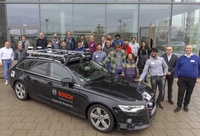The next generation of AI algorithms for automated driving
A cooperation with the University of Freiburg and Bosch Research seeks to enable safer, more transparent, and more robust overall systems. The focus is on interconnected and jointly optimized modules for automated driving. The cooperation is part of an initiative to strengthen applied research on automated driving in Germany.
“The cooperation project AI-Drive between the University of Freiburg and Bosch Research is our endeavor to develop the next generation of AI algorithms for automated driving to enable safer, more transparent, and more robust overall systems,” emphasizes project leader Prof. Dr. Abhinav Valada from the Faculty of Engineering at the University of Freiburg during the kick-off. “To that end, the project is also an initiative to strengthen research on automated driving in Germany”. The project is scheduled to run for three years. Bosch is funding the project with a total of around 3.7 million euros and is providing real test vehicles, under the leadership of Dr. Claudius Gläser. On the University of Freiburg side, ten doctoral students are involved in the research under the direction of Prof. Dr. Abhinav Valada, Prof. Dr. Frank Hutter, and Prof. Dr. Joschka Bödecker from the Faculty of Engineering and the ELLIS Unit Freiburg, in close collaboration with researchers from Bosch Research.
“The technological advancement in automated driving traditionally focuses on developing individual autonomy modules separately for perception, prediction, planning, and control” explains Valada. “With the new generation of AI algorithms, we want to create a unified framework in which different modules are closely connected and jointly optimized.” One goal, for example, is the close coupling of prediction and planning modules. “This will enable us to get even closer to human driving behavior, for example in terms of avoiding overly cautious or aggressive driving,” says Valada. AI-Drive also pursues a transparent "white box" approach compared to conventional deep learning models with low transparency. Components within the system are designed to deliver intermediate results that can be interpreted by humans, thereby promoting trust and simplifying certification processes.
"The cooperation with the University of Freiburg is for us an important link to cutting-edge research in the field of automated driving," says Dr. Claudius Gläser from Bosch Research, "and it allows us both to jointly advance the state of research and to incorporate it directly into future automation solutions."
The project will also develop innovative methods for neural architecture search that will automate the design and optimization of network architectures and thereby make the development and deployment cycle more efficient. “Overall, we hope that these developments will lead to a safer, more transparent, and more robust overall system for autonomous driving,” states Prof. Dr. Frank Hutter.
The project also aims to provide a significant impact for the scientific community. Technological and theoretical innovations resulting from this collaboration will be published in top-ranking scientific journals and conferences. In addition, symposiums will be organized every six months in which the doctoral students will present their work and the methods developed will be evaluated.
„AI-Drive“ builds on many years of collaboration between the University of Freiburg and Bosch Research in the field of machine learning. 2018-2022, for example, Hutter’s Machine Learning Lab already closely collaborated with Bosch Research to strengthen joint research on AutoML.
Link to original press release: https://kommunikation.uni-freiburg.de/pm-en/press-releases-2023/the-next-generation-of-ai-algorithms-for-automated-driving?set_language=en
Contact:
Prof. Dr. Abhinav Valada
Robot Learning Lab
Department of Computer Science
University of Freiburg
E-Mail: valada(at)cs.uni-freiburg.de
Prof. Dr. Frank Hutter
Department of Computer Science
University of Freiburg
E-Mail: fh(at)informatik.uni-freiburg.de
Prof. Dr. Joschka Bödecker
Department of Computer Science - IMBIT
University of Freibur
E-mail: jboedeck@cs.uni-freiburg.de
Kerstin Steiger-Merx
Representative PR/Marketing
Faculty of Engineering
University of Freiburg
Tel.: 0761/203-8056
E-Mail: steiger-merx@tf.uni-freiburg.de

